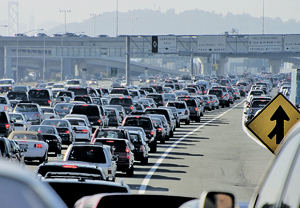Advertisement
Grab your lab coat. Let's get started
Welcome!
Welcome!
Create an account below to get 6 C&EN articles per month, receive newsletters and more - all free.
It seems this is your first time logging in online. Please enter the following information to continue.
As an ACS member you automatically get access to this site. All we need is few more details to create your reading experience.
Not you? Sign in with a different account.
Not you? Sign in with a different account.
ERROR 1
ERROR 1
ERROR 2
ERROR 2
ERROR 2
ERROR 2
ERROR 2
Password and Confirm password must match.
If you have an ACS member number, please enter it here so we can link this account to your membership. (optional)
ERROR 2
ACS values your privacy. By submitting your information, you are gaining access to C&EN and subscribing to our weekly newsletter. We use the information you provide to make your reading experience better, and we will never sell your data to third party members.
Environment
Car Makers Versus California
Adversaries prepare for fight over limits on vehicle emissions
by Cheryl Hogue
May 28, 2007
| A version of this story appeared in
Volume 85, Issue 22
CALIFORNIA and automakers are gearing up for a major court battle over the regulation of greenhouse gas emissions from vehicles.
Both sides are waiting for EPA to decide whether it will allow California to place a limit on greenhouse gas emissions from new cars and trucks, beginning in model year 2009. Whatever it decides, the agency is likely to end up in court.
EPA is considering California's request in the wake of a Supreme Court ruling in April that carbon dioxide is an air pollutant (C&EN, April 9, page 9). The agency is expected to announce its decision on California's request this summer.
At an EPA public meeting and a Senate hearing, both held on May 22, California Attorney General Edmund G. (Jerry) Brown Jr. argued that the Golden State should get federal approval for regulating vehicles' greenhouse gas emissions.
Global warming has reduced snow pack, raised sea levels, increased urban ozone pollution, and boosted the risk of wildfires in California, Brown said. Regulating greenhouse gas emissions from vehicles is an essential component of addressing climate change, he added.
But the auto industry contends that EPA should reject the request because the state's emission control plan for vehicles won't, by itself, remedy the impacts of climate change. Steven Douglas, director of environmental affairs for the Alliance of Automobile Manufacturers, said at the EPA meeting that California has not demonstrated how the vehicle emission control plan will alleviate sea-level rise or other effects of global warming.
The Clean Air Act allows California to set tighter-than-federal standards for vehicle emissions to address environmental problems only within the state, Jonathan H. Adler, a law professor at Case Western Reserve University, told the Senate Environment & Public Works Committee. Because climate change is a global problem, the agency's decision "could be subject to court challenge" if EPA grants the California request, Adler said.
Meanwhile, Brown said California is ready to sue if EPA rejects the request or fails to make its decision by Oct. 24, a deadline established by Gov. Arnold Schwarzenegger.






Join the conversation
Contact the reporter
Submit a Letter to the Editor for publication
Engage with us on Twitter